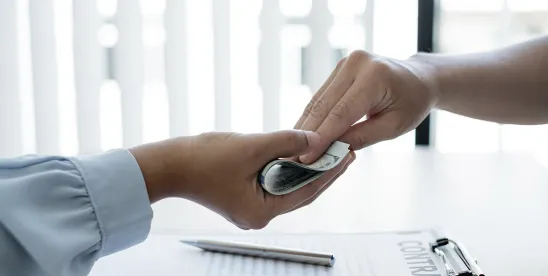In a term filled with important and bitterly divided decisions, the US Supreme Court’s decision in Snyder v. United States last week may be the sleeper pick for most controversial. Various media publications have characterized the decision as follows: “The Supreme Court Majority Just Legalized Corporate Bribery;” “The Supreme Court Rules That State Officials Can Engage In A Little Corruption, as a Treat;” “The Supreme Court’s Bribe Enthusiasts Just Made Bribery A Little Easier;” and our personal favorite, “Will Public Servants Be Next To Put Out A Tip Jar?”
So, what is this fuss all about? In a 6-3 decision, the Supreme Court has further narrowed the government’s application of anti-corruption statutes against state and local public officials, ruling that Section 666 only applies to bribes received in exchange for official acts and not to gratuities or gifts received afterwards. Justice Kavanaugh, writing for the majority, characterized the issue in Snyder as follows: “Section 666 of Title 18 makes it a crime for state and local officials to ‘corruptly’ solicit, accept, or agree to accept ‘anything of value from any person, intending to be influenced or rewarded’ for an official act.” §666(a)(1)(B). That law prohibits state and local officials from accepting bribes that are promised or given before the official act. Those bribes are punishable by up to 10 years’ imprisonment. The question in this case is whether §666 also makes it a crime for state and local officials to accept gratuities — for example, gift cards, lunches, plaques, books, framed photos, or the like — that may be given as a token of appreciation after the official act. The answer is no.”
Background
In Snyder, former Portage, Indiana Mayor James Snyder (“Snyder”) received a $13,000 cash gift from Great Lakes Peterbilt. The trucking company had previously been awarded two city contracts and sold five garbage trucks to the city of Portage for approximately $1.1 million. Federal prosecutors charged Snyder with receiving an unlawful gratuity in violation of 18 U.S.C. § 666(a)(1)(B), although Snyder claimed the payment was for consulting services. Ultimately, a federal jury convicted Snyder and the conviction was affirmed by the US Court of Appeals for the Seventh Circuit.
Section 666 was enacted in an effort to make the anti-bribery and gratuity provisions for federal officials (18 U.S.C. § 201, et seq.) apply equally to officials at the state, local and tribal government levels. The Court has struggled for over three decades with the breadth of the parallel federal statute. See generally McDonnell v. United States, 579 U.S. 550 (2016); United States v. Sun Diamond Growers, 526 U.S. 398 (1999); United States v. McCormick, 500 U.S. 257 (1991). Under the operative terms of the statute — imposing criminal penalties on federal officials who seek or accept “anything of value” for “any official act” 18 U.S.C. § 201(c)(1)(B) (emphases added) — the critical analysis usually turns on the “official act” inquiry because the “value” inquiry is so easily satisfied.[1] The Snyder decision falls right in line with the 30-plus year evolution of the Court’s thinking about this “official act” component of the statute.
The Court’s Decision
As Justice Kavanaugh summed it up, because “§666 tracks §201(b), the bribery provision for federal officials [a] state or local official can violate §666 when he accepts an up-front payment for a future official act or agrees to a future reward for a future official act. But a state or local official does not violate §666 if the official has taken the official act before any reward is agreed to, much less given. Although a gratuity offered and accepted after the official act may be unethical or illegal under other federal, state, or local laws, the gratuity does not violate §666.” The timing considerations in this outcome are driven by the statute’s use of the term “for” to connect the “thing of value” with the “official act.” Something promised or given after the official act in question cannot chronologically have been for that act.
Snyder is, thus, hardly a Supreme Court authorization of influence-peddling at large. In fact, the statute prohibiting federal officials from receiving a gratuity, 18 U.S.C. § 201(c), was not implicated by the decision. It is, rather, best viewed as a technical statutory interpretation case with an overlay of states’ rights/federalism concerns resolving the question of whether federal or state law should govern the actions of state, local and tribal officials when it comes to after-the-fact gifts from those doing business with their employer. Nothing more and nothing less.
Impact
After Snyder, companies doing business with state, local and tribal governments can feel more comfortable — at least under federal law — providing traditional corporate marketing swag (baseball caps, tee shirts and the like) as gifts to their customers “after” their work is awarded or completed. Those companies should continue to refrain making any such gifts, or promising the same, “before” their work is awarded or completed. Timing is everything, as they say.
Companies must also remain mindful, however, of whatever state, local or tribal laws might be independently applicable to such gift-giving conduct. It is especially important to be careful with the character of the gifts given. Bestowing a company baseball cap on a state official with whom the company does regular business is one thing, arranging for an all-expenses paid trip to Las Vegas is another. The former will look like normal business behavior to state, local or tribal law enforcement, while the latter will look like something more sinister.
One final basic word of caution: under all regulatory regimes, and under all circumstances, refrain from giving cash gifts. They are the biggest “red flag” of all for law enforcement.
[1] Almost everything has some value, no matter how small it might be. Exceptions to this rule are hard to imagine. Perhaps a ticket to a New York Yankees baseball game would have no value to an ardent Boston Red Sox fan. But even in the extreme hypothetical, the Yankees ticket has some value because the Red Sox fan could always resell the ticket to someone else for money.




 />i
/>i

